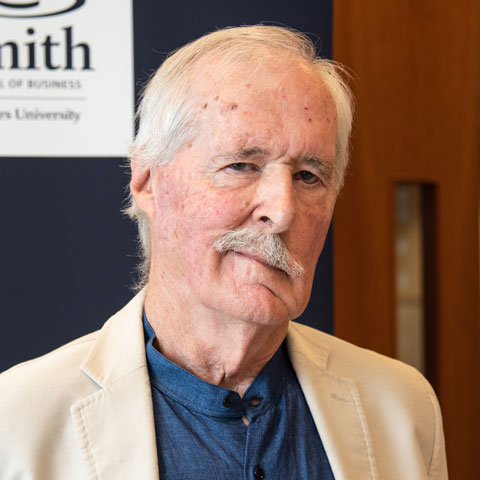
William Cooper
Professor Emeritus- ORCID: 0000-0002-4259-7293
Overview
After four decades of academic talking and writing, Bill Cooper is retired, enjoying reading good books, taking long walks in the woods with friends, advocating for a Basic Income Guarantee, and, with the ever-delightful Margaret, grandparenting in Ontario and British Columbia.
Download Full CV Appointment Type
Emeritus
Academic Area
- Organizational Behaviour
Interest Topics
Faculty Details
Profile
Full Bio
After four decades of academic talking and writing, Bill Cooper is retired, enjoying reading good books, taking long walks in the woods with friends, advocating for a Basic Income Guarantee, and, with the ever-delightful Margaret, grandparenting in Ontario and British Columbia.
Academic Degrees
PhD, Organizational Behavior
University of Toronto (1978)
MBA, Industrial Relations
McMaster University (1971)
BA Philosophy
University of Rochester (1967)
Publications
Publications Refereed
Cooper, W. H. (2019). So what: Inviting methodological zealots to think more deeply. Management Teaching Review, 4, 157-163.
Whiteman, G. and Cooper, W. H. (2016). Decoupling rape. Academy of Management Discoveries, 2, 115-154.
- Winner of the 2016 Academy of Management Discoveries Best Paper Award
Graham, W. J. & Cooper, W. H. (2013). Taking credit. Journal of Business Ethics, 115, 403425.
Whiteman, G. & Cooper, W. H. (2011). Ecological sensemaking. Academy of Management Journal, 54, 889-911.
Gray, P. H. & Cooper, W. H. (2010). Pursuing failure. Organizational Research Methods, 13, 620-643.
Stone, T. H. & Cooper, W. H. (2009). Emerging credits. The Leadership Quarterly, 20, 785798.
Cooper, W. H. & Withey, M. J. (2009). The strong situation hypothesis. Personality and Social Psychology Review, 13, 62-72.
Whiteman, G. & Cooper, W. H. (2006). Sixty six ways to get it wrong: A response to Banerjee and Linstead. Human Relations, 59, 409-427.
Whiteman, G. & Cooper, W. H. (2000). Ecological embeddedness. Academy of Management Journal, 43, 1265-1282.
Reprinted in J. Jermier (ed.) (2013). Corporate environmentalism and the greening of organizations, vol. 1. London: Sage.
Cooper, W.H., Gallupe, R.B., Pollard, S.L. & Cadsby, J. (1998). Some liberating effects of anonymous electronic brainstorming. Small Group Research, 29,147-178.
Gallupe, R.B., Cooper, W.H., Grise, M.L. & Bastianutti, L.M. (1994). Blocking electronic brainstorms. Journal of Applied Psychology, 79, 77-86.
Gallupe, R.B. & Cooper, W.H. (1993). Brainstorming electronically. Sloan Management Review, 35, 27-36.
Gallupe, R.B., Dennis, A.R., Cooper, W.H., Valacech, J.S., Bastianutti, L.M. & Nunamaker, J.F. Jr. (1992). Electronic brainstorming and group size. Academy of Management Journal, 35, 350-369.
Withey, M.J. & Cooper, W.H. (1992). What’s loyalty? Employee Responsibilities and Rights Journal, 5, 231-240.
Gallupe, R.B., Bastianutti, L.B. & Cooper, W.H. (1991). Unblocking brainstorms. Journal of Applied Psychology, 76, 137-142.
Withey, M.J. & Cooper, W.H. (1989). Predicting exit, voice, loyalty, and neglect. Administrative Science Quarterly, 34, 521-539.
Cooper, W.H. (1986). Like Sonny. The Organizational Behavior Teaching Review [now Journal of Management Education], 10, (3), 12-18.
Cooper, W.H. & Richardson, A.J. (1986). Unfair comparisons. Journal of Applied Psychology, 71, 179-184.
Reprinted in S. Schneider (ed.) (2013). Experimental design in the behavioral and social sciences, vol. 3. London: Sage Cooper, W.H. (1985). A courteous response to Sohn. Journal of Personality and Social Psychology, 49, 1351.
Withey, M.J., Daft, R.L. & Cooper, W.H. (1983). Measures of Perrow's work unit technology: An empirical assessment and a new scale. Academy of Management Journal, 26, 45-63.
Cooper, W.H. (1983). Internal homogeneity, descriptiveness and halo: Resurrecting some answers and questions about the structure of job performance rating categories. Personnel Psychology, 36, 489-502.
Cooper, W.H. (1983). An achievement motivation nomological network. Journal of Personality and Social Psychology, 44, 841-861.
Cooper, W.H. (1981). Conceptual similarity as a source of illusory halo in job performance ratings. Journal of Applied Psychology, 66, 302-307.
Cooper, W.H. (1981). Ubiquitous halo. Psychological Bulletin, 90, 218-244.
Invited Chapters
Cooper, W.H., Graham, W.J. & Dyke, L.D. (1993). Tournament players. Research in Personnel and Human Resources Management, 11, 83-132.
Jawahar, I.M., Stone, T.S. & Cooper, W.H. (1992). Activating resources in organizations. Research in Organizational Change and Development, 6, 153-196.
Non-refereed
Cooper, W.H. (1984). Are you free tonight? The Organizational Behavior Teaching Review, 9 (2), 103-104.
Cooper, W.H. (1982). Police officers over career stages. Canadian Police College Journal, 6, 93-112.
Cooper, W.H. (1980). Play well thy part. Training and Development Journal, 34 (8), 64-68.
Neave, E., Cooper, W.H., MacDonald, V. & Petersen, E. (1980). Management issues in Canadian municipal policing. Canadian Police College Journal, 4, 32-66.
Cooper, W.H. (1980). Agenda setting in the first class. The Organizational Behavior Teaching Review, 5, 57.
Poetry
Cooper, W. H. (1972). Winter lament. Antigonish Review.
Cooper, Bill (April 2024). Rhythms of False Creek. Between the bridges.
Cases
Cooper, W.H. (2001). Katie Lucerne. In T. F. Cawsey, G. Deszca, and A. J. Templer (Eds.), Canadian cases in human resource management. Toronto: Prentice-Hall
Ektvedt, C. & Cooper, W.H. (1987). Family ties. Unpublished case.
Klein, S. & Cooper, W.H. (1985). A winter tale. Unpublished case.
Healey, R. & Cooper, W.H. (1984). The wild one. Unpublished case.
Roozen, H. & Cooper, W.H. (1984). Sisyphus, by night. Unpublished case. Poch, N. & Cooper, W.H. (1984). Prince Arthur. Unpublished case.
MacNeil, W.J. & Cooper, W.H. (1974). Dominion Acceptance Company Ltd.